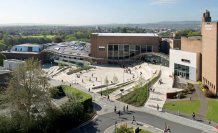
Professor Sabina Leonelli and Professor Stefan Kraus will lead separate projects that have received five-year grants from the respected research council through its Consolidator Grants funding scheme.
Leading researchers receive prestigious ERC funding awards
Two of the University of Exeter’s most respected researchers have received a significant funding boost from the European Research Council (ERC), it has been announced.
Professor Sabina Leonelli and Professor Stefan Kraus will lead separate projects that have received five-year grants from the respected research council through its Consolidator Grants funding scheme.
Professor Leonelli, who is a Professor of Philosophy and History of Science, will lead a major new research project that will support open science implementation around the world.
Professor Kraus, meanwhile, will lead an international team of researchers to explore the origin of diversity in star and planetary systems. The five-year project has received €3million in funding.
The ERC announced the winners of its latest Consolidator Grant competition for mid-career researchers today (December 9th). The funding is part of the EU’s current research and innovation programme, Horizon 2020, and worth in total €655 million.
Professor Leonelli’s project will focus on the open science movement – where experts share information to help facilitate scientific discovery and help researchers to replicate findings - is transforming research. It has led to policies adopted around the globe to increase openness, transparency and reproducibility.
Experts will now develop a philosophy of this movement for the first time. This will help to showcase the diversity of research environments around the world and set out how researchers can use open science to promote good practice. The work will lead to a clearer vision for what constitutes good open science and under what conditions it can be achieved, while also taking into account existing disparities in approaches, resources and perceptions of the significance of scientific work.
Professor Leonelli said: “I am delighted that the European Research Council gave me this chance to investigate how the open science movement can support scientists working in very different environments. We will explore the inequities affecting research around the world and facilitate transnational collaboration that acknowledges the value of diverse methods and perspectives. The project will focus on plant and agricultural research contributing to tackle two key challenges for post-COVID times: food security and planetary health.
“The resulting philosophical framework will help to set out the relationship between different research environments, the different ways in which researchers utilize the digital tools and infrastructures that underpin open science, and what constitutes best research practice. It will show the diversity of research environments around the world, and the role of open science in providing reliable knowledge because of this diversity.”
Professor Stefan Kraus will lead an international team to explore the origin of diversity in star and planetary systems.
In the new project, the team of researchers will study the orbital configuration of hundreds of star-star and star-planet systems and apply a novel approach that allows them to measure the properties of the stars, their orbits, and the alignment between the orbital axis and the stellar rotation axis.
“We should be able to find out how these systems typically look like at the time of formation and what dynamical interactions happen afterwards,” said Professor Kraus. “Intriguingly, we can study both star-star and star-planet systems with our method and learn what mechanisms are common between star and planet formation, and how they differ.”
To enable these breakthroughs, the team will build an interferometric instrument, named BIFROST, that combines the light from telescopes spread out more than hundred metres apart. This will enable exquisite precision, while, at the same time, enable measurements at unprecedented high spectral resolution.
“Combining the extreme precision achievable with interferometry and high spectral resolution is the key for this project,” said Professor Kraus, “but it will enable also many other innovative application in the future, ranging from studying the gas around active galactic nuclei to characterising the atmospheres of exoplanets.”
Date: 9 December 2020
